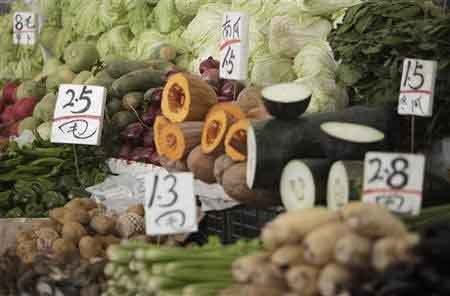一项英国研究称,如果学龄前小孩不愿吃蔬菜,只要他们尝尝味道,就给他们一些小奖励,或许可以帮助小孩吃下原本不想吃的食物。研究发现,每当3、4岁的小孩吃点不喜欢的蔬菜,家长就发贴纸给他们,可以慢慢改变小孩的态度。几周后,获得这种奖励的小孩,对蔬菜的评价变高,从1到2级(大概介于“恶心”与“还好”),上升到2到3级,相当于“还好”与“好吃”之间。研究显示,在实验室的味觉试验中,有贴纸奖励的小孩也更愿意吃更多蔬菜,不管是红萝卜、芹菜、小黄瓜、红辣椒、卷心菜还是碗豆。而口头赞美之所以无效,是因为小孩可能觉得爸妈说的话“不真诚”。

|
 |
|
Vegetables and their prices are seen at a market in Beijing December 8, 2011. |
If your preschoolers turn up their noses at carrots or celery, a small reward like a sticker for taking even a taste may help get them to eat previously shunned foods, a UK study said.
Though it might seem obvious that a reward could tempt young children to eat their vegetables, the idea is actually controversial, researchers wrote in the American Journal of Clinical Nutrition.
That's because some studies have shown that rewards can backfire and cause children to lose interest in foods they already liked, said Jane Wardle, a researcher at University College London who worked on the study.
Verbal praise, such as "Brilliant! You're a great vegetable taster," did not work as well.
"We would recommend that parents consider using small non-food rewards, given daily for tasting tiny pieces of the food -- smaller than half a little finger nail," Wardle said in an email.
The study found that when parents gave their three- and four-year-olds a sticker each time they took a "tiny taste" of a disliked vegetable, it gradually changed the children's attitudes.
Over a couple of weeks, children rewarded this way were giving higher ratings to vegetables, with the foods moving up the scale from between 1 and 2 -- somewhere between "yucky" and "just okay" -- to between 2 and 3, or "just okay" and "yummy."
The children were also willing to eat more of the vegetables -- either carrots, celery, cucumber, red pepper, cabbage or sugar snap peas -- in laboratory taste tests, the study said.
Researchers randomly assigned 173 families to one of three groups. In one, parents used stickers to reward their child each time they took a tiny sample of a disliked vegetable.
A second group of parents used verbal praise. The third group, where parents used no special veggie-promoting tactics, served as a "control."
Parents in the reward groups offered their child a taste of the "target" vegetable every day for 12 days.
Soon after, children in the sticker group were giving higher ratings to the vegetables -- and were willing to eat more in the research lab, going from an average of 5 grams at the start to about 10 grams after the 12-day experience.
The turnaround also seemed to last, with preschoolers in the sticker group still willing to eat more of the once-shunned veggie three months later.
Why didn't the verbal praise work? Wardle said the parents' words may have seemed "insincere" to their children.
相关阅读
(Agencies)

(中国日报网英语点津 Rosy 编辑)